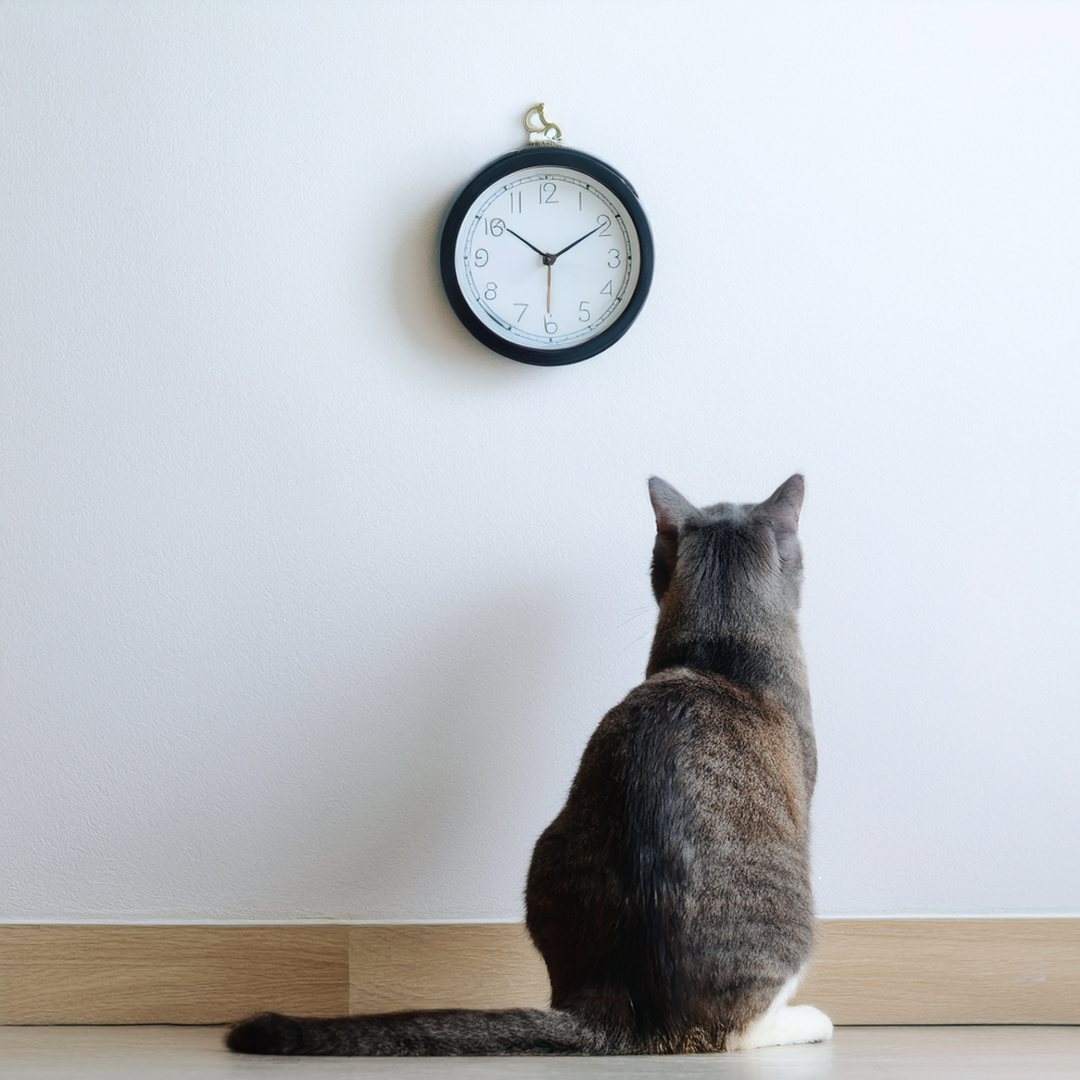
1. Reading the Environment
Dawn and Dusk = Cat Rush Hour
Cats are most active in the early morning and evening. In the wild, they sleep during the day and wake up when small animals are moving around. This natural habit affects when they feel hungry — which is often around sunset.
Using Clues to Tell Time
Cats watch and listen to what’s happening around them to guess the time. Morning bird songs mean “daytime is here,” and an alarm clock means “human is waking up.” If you sleep in, your cat might come and meow, paw, or jump on you to get you up.

2. The Inner Biological Clock
Precision Timekeepers
Cats have an internal biological clock that regulates their daily rhythm, including when they eat. Research shows that cats can distinguish surprisingly short time differences — even between 5, 8, 10, and 20 seconds. This precise timing helps them during hunting, where they must anticipate prey movements and patterns.
Meal-Time Habits
Cats often learn to expect food at the same time each day, especially when they share a close bond with their human. Because they are semi-social animals, they become sensitive to human routines. If a cat is regularly fed at a set hour, it will start to anticipate it — and will happily remind you when it’s “that time” again.

A cat’s talent for knowing mealtime comes from a mix of things — their body’s internal clock, social bonds, human routines, and daily habits. Whatever the reason, this skill makes cats impressively punctual and incredibly observant — true little hunting experts!
Catlien
-

The Language of Cat Tails
Regular price £0.00 GBPSale price £0.00 GBP Regular priceitem / per -

Why Does My Cat Try to Bury Its Food?
Regular price £0.00 GBPSale price £0.00 GBP Regular priceitem / per -

Why Does My Pet Follow Me to the Loo
Regular price £0.00 GBPSale price £0.00 GBP Regular priceitem / per -

Why Do Cats Love Boxes?
Regular price £0.00 GBPSale price £0.00 GBP Regular priceitem / per
-

7 Signs of a Cat Allergic Reaction
Regular price £0.00 GBPSale price £0.00 GBP Regular priceitem / per -

How To Prevent Cat Allergic Reactions
Regular price £0.00 GBPSale price £0.00 GBP Regular priceitem / per
-

Can Cats Eat Berries?
Regular price £0.00 GBPSale price £0.00 GBP Regular priceitem / per -

8 Things Cats Should Never Eat
Regular price £0.00 GBPSale price £0.00 GBP Regular priceitem / per -

Is Pumpkin Good for Cats?
Regular price £0.00 GBPSale price £0.00 GBP Regular priceitem / per -

Should You Share Ham with Your Cat?
Regular price £0.00 GBPSale price £0.00 GBP Regular priceitem / per
-

The Language of Cat Tails
Regular price £0.00 GBPSale price £0.00 GBP Regular priceitem / per -

Why Does My Cat Try to Bury Its Food?
Regular price £0.00 GBPSale price £0.00 GBP Regular priceitem / per -

Why Does My Pet Follow Me to the Loo
Regular price £0.00 GBPSale price £0.00 GBP Regular priceitem / per -

Why Do Cats Love Boxes?
Regular price £0.00 GBPSale price £0.00 GBP Regular priceitem / per
-

My Cat Won’t Drink Water—What Should I Do?
Regular price £0.00 GBPSale price £0.00 GBP Regular priceitem / per -

Cat Owners Must Know: Safe Alone Time for Cats
Regular price £0.00 GBPSale price £0.00 GBP Regular priceitem / per -

Rather Starve Than Eat? 3 Reasons Your Cat Is Picky About Food
Regular price £0.00 GBPSale price £0.00 GBP Regular priceitem / per -

4 Tips to Improve Your Cat’s Picky Eating Habits
Regular price £0.00 GBPSale price £0.00 GBP Regular priceitem / per













